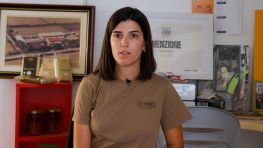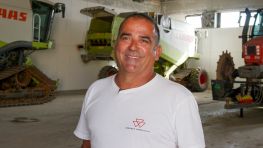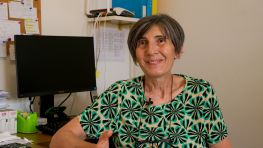 Rosalia Vacca and the Dream of…
Rosalia Vacca and the Dream of… Marco Ducco
From construction to organic farming.
The industrial nature of rice production which requires large capital and technical skills makes it difficult for new players to enter this world. There are rare examples of rice growers who do not have a long family tradition behind them, Marco Ducco, from Cascina Angiolina in Buronzo is among them. Since 2016, following health problems and the profound economic crisis that the construction world was going through, to which he had dedicated his professional career, he decides to change his life and move from the frenetic and crazy world of construction to the rhythms cadenced by the seasons. agriculture.
Marco places his family, his wife and two children at the center of all his actions, with whom he shares every step of his journey in the world of rice growing: they are the beating heart of Cascina Angiolina. The choice to devote himself to a different, non-industrial agriculture is also born from an ethical substratum shared with his family, an agriculture that places the well-being of those who work in the company above any choice, of all those who they consume its products and, last but not least, respect for the ecosystems that characterize the spaces that the company uses.
Right from the start, it is clear to everyone that growing organic rice is no joke: preparation, specific skills and observation skills are needed that are not part of the family's cultural background and are not even codified in convenient informative manuals. Being a farmer is a complex job and growing organic rice is even more difficult, you need skills that must be sought in the area.
However, luck is on the side of the Ducco family and the time is ripe: the group of organic producers from Rovasenda immediately makes them part of their larger project. If the first advice comes from a wine producer to whom Marco had built the cellar, the group of farmers from Rovasenda becomes a constant point of reference to rely on to dispel the most substantial doubts. Today the Duccos are an active part of the "Bioveri" group as the Rovasenda rice growers define themselves as opposed to the "biofurbi" who only pretend to produce rice that is respectful of man and the environment.
Marco does not hide the amazement of the other farmers when he started his adventure: he was a bricklayer who wanted to be a farmer and moreover cultivating organically. Being completely free from a family tradition and a wealth of technical knowledge in the field of rice cultivation was undoubtedly a limitation in the first years of activity but, at the same time, it also represented a form of freedom from pre-established cultural cages and strengthened by time. Marco and his family were thus able to freely build and interpret their own space, working methods characterized by a placid impetuousness. What seems at first glance an oxymoron describes in a crystalline way the experience of those who will spend some of their time at Cascina Angiolina.
Video table of contents
- Farmer since 2016, a choice made with the whole family.
- After 30 years of work in construction, the choice to dedicate ourselves to agriculture, to organic farming.
- Organic farming as a choice for a better society. Human relations in agriculture. Alone it's really hard!
- How I started and the influence of the Stocchi and their neighbor "Nino"
- The freedom to start from scratch: free to make mistakes! The importance of trusting.
- The first year I was a bricklayer who goes to be a farmer, or rather a bricklayer who does organic!
- When farmers looked at my fields they first shook their heads then slowed down to look, the curiosity of other farmers. The most curious old men. Young people fail to dialogue.
- Older people remember what it was like before great chemistry, young people prefer not to face the problem.
- The Biodistrict as a tool to address the fears and problems of conversion to organic farming.
- Organic farming values the human aspect.
- Cultivation methods for organic rice: scutching and green mulching.
- Conventional and Organic are getting closer.
- Direct sales in an organic farm: it is essential to convey the message we believe in. It counts more than the price.
- When you believe in one thing, every day is a working day. The work does not weigh on you.
- Loving the rice you cultivate, the most difficult phases that lead me to suffer with it.
- Compliments from customers are slaps on the back that make everyone smile.
- The inspectors: a human capital that can make organic products grow.
- Understanding the world of farmers with the head of a builder: changing the way of thinking was difficult.
- The relationship with farmers and synergies with agriculture.
- The soil that has been heavily polluted slowly regenerates and returns to being productive without synthetic fertilization.
- I saw the frogs again.
- A company where decisions are shared.
- The open company where you feel good.
- The varieties we grow: Gladio, Carnaroli, Cammeo, Sant'Andrea. People are pushing the market to offer better products.
- Comparison between construction and agricultural work. In agriculture in general, less frenetic rhythms. We must not keep up with the lobbies of seeds, of plant protection products that aim to increase their business by making you run.
- Rice with Curry and the link with Africa.
Interview information
Country: IT
Region: Piemonte
City: Buronzo
Suburb: via Cascina Bicocca 2
Urls: Cascina Angiolina
Marco Ducco
Date of birth: 03-31-1969
Profession: Farmer
Languages: Italiano
Document by: Luca Ghiardo
Video by: Luca Ghiardo
Created: 01-06-2021
Questo video fa parte del seguente archivio
Rice stories
Rice stories
Food is a fundamental resource for man and his health, both through the supply of nutrients and the ability to embody traits of human culture that play a leading role in our well-being.
Over time, each territory has built original ways in which to relate to the fruits of its land, enriching them with rituals, symbolic meanings and culinary customs. Much of these relationships have been lost following the years of the economic boom, with the exodus from the countryside to urban centers, with the advent of agriculture for mass production and ultimately with the globalization of markets and the consequent impoverishment of the heritage of biodiversity and ethnodiversity.
The purpose of this archive is to collect evidence relating to the main rice production area in Europe, that is the Po Valley, and to investigate, through the analysis of textual sources and testimonies collected in the field, both what survives of this heritage, and the ways in which which has evolved and reached us, paying particular attention to the explicit and implicit links that bind food and health.






